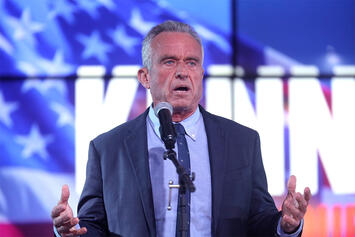
Amid the muck created by America’s two inadequate presidential frontrunners, green shoots are rising. They may not grow to maturity this year, but the basis for the emergence of better political choices already exists and is showing surprising life.
The majority of voters, particularly independents, do not want a Biden-Trump rematch. That’s no surprise, since three-quarters of the population think that Joe Biden is too old, with the vast majority considering him not mentally up to the job. For his part, Donald Trump has consistently failed to gain approval from more than 42% of the electorate. Astonishingly, the most favoured of all the candidates is neither one of these two, but instead independent candidate Robert Kennedy.
This all reflects a deep political despair. Nearly two-thirds of Americans dislike the political status quo, and barely 4% think the system is working well, a Pew survey found, while 75% feel that national leadership has declined in recent years, according to Rasmussen polling from last month. Crucially, independents still form the largest voting bloc in the US, with 43% of adults identifying as such.
But the growing disenchantment could also become a source of hope for a new breed of leaders. In the Republican Party — despite her frankly disingenuous comments about the Civil War — Nikki Haley has emerged as a viable alternative to Trump. Among Democrats, we see the rise to prominence of independent-minded liberals like Pennsylvania Senator John Fetterman, the onetime progressive heartthrob who works closely on issues with conservatives such as Sen. J.D. Vance.
Like a majority of Americans, Fetterman aggressively supports Israel and wants to staunch the open border. Unsurprisingly, he is denounced by the progressive press for breaking the party line. Similar treatment was accorded to Arizona Senator Kyrsten Sinema, now an independent. The people are willing, unlike Biden and the party establishment, to take on the lunatic Left fringe that now infects the Democratic Party on anything from Israel-Palestine to the impact of the porous border.
Going beyond the horse race analyses, we see old alliances shattered and future prospects far more unpredictable. Working-class voters, once the prime constituency of the Democratic Party, have been shifting decisively toward Republicans. Minorities, who make up over 40% of the nation’s working class and will constitute the majority by 2032, are now jumping ship in considerable numbers.
The big issue, as usual, is the economy, which only 20% of voters rate as “excellent” or “good”, versus 49% who call it “poor”, according to a New York Times/Siena poll. Americans remain overwhelmingly pessimistic about the country’s future. That is likely why Kennedy’s odd mélange of environmentalism and populism (with an occasionally conspiratorial tinge), have made him the favourite of voters under 35. This likely doesn’t reflect a revival of the old Kennedy worship, as the young barely know who his father and uncle were.
Read the rest of this piece at UnHerd.
Joel Kotkin is the author of The Coming of Neo-Feudalism: A Warning to the Global Middle Class. He is the Roger Hobbs Presidential Fellow in Urban Futures at Chapman University and Executive Director for Urban Reform Institute. Learn more at joelkotkin.com and follow him on Twitter @joelkotkin.
Marshall Toplansky is a widely published and award-winning marketing professional and successful entrepreneur. He co-founded KPMG's data & analytics center of excellence and now teaches and consults corporations on their analytics strategies.
Photo: by Gage Skidmore, via Flickr under CC 2.0 License.












